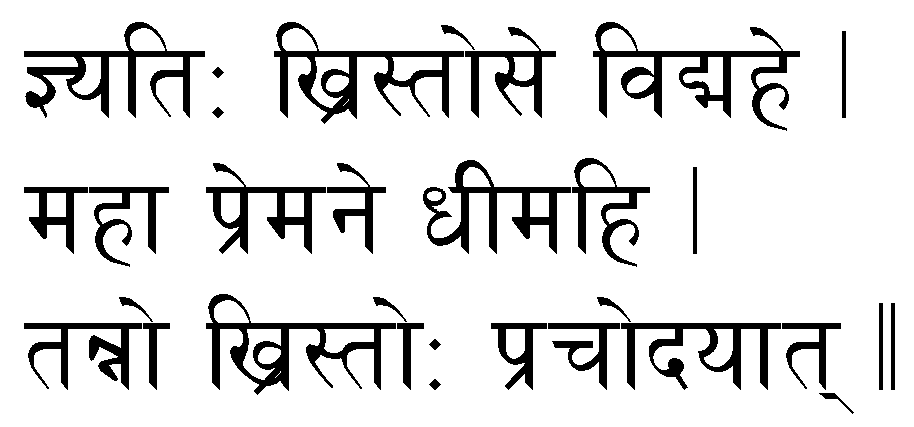The Christ Mantra
So what is this now? A mantra for Christ? Isn’t that Indian stuff? How can we mix Hinduism with Christianity? But it isn't really a matter of mixing them. It is only a matter of a prayer in a traditional form, which could actually be quite powerful.
Lots and lots of people have found their way to Indian spiritualism, and many of them then found their way back to Christianity, like I did. We returned to Christianity, enriched with the Indian experience. Church theologians will find this horrible, but: There is only one truth – agree? And other cultures will also have found their part of the one truth. Or do you really think that they are all wrong, and completely wrong in all and everything they know and teach, unless they become Christians? That would be quite hypocritical – indeed… The Church variety of Christianity wants to monopolize both the truth and God. God will not let himself be monopolized… Truth is what it is and not what you want it to be... What scriptures really say is often more true than the human interpretation of it...
Consider the following image: There is a high mountain, and on top of it is a bright light. Several paths go towards that mountain. People are walking on those paths. The light looks different, seen from the different paths. From one path it looks like a cross. From another like a Hebrew menorah. From still another like a moon crescent. And from another like a meditating Buddha. And again from another like an Indian Trimūrti. And so on.
People on the paths shout to people on other paths: «Come here! You are on the wrong path! Only this path leads to the top of the mountain!» They all shout the same thing to all others, and they loose lots of time arguing and trying to convince the others. Because they see the own path lead to the mountain, but they don’t see that the other paths also do so. Sometimes they even get involved in violence against the others and loose their path, gone astray into darkness, until they after a long time find back to it again (or maybe to another path).
When they finally reach the mountain, they begin to ascend it. On the way up they have to pass some gates. At each gate they have to open their backpack and take out some ballast of old wrong ideas, misconceptions and misunderstandings and replace them with new insights. As they come higher, they become astonished to see that some of the other paths (they don’t see them all) are also ascending along with their path. They hadn’t expected that. When they eventually reach the top, they find that all paths join there, and that the light is only light, because the symbolism in the appearance was only an illusionary visual distortion. Now there is no difference, anymore. They greet all the others as their brothers and sisters and reconcile for their mistakes on the way.
All cultures are cultures of human beings. All have their share of the truth, and all have deformations due to human mistakes and misunderstanding. All have both light and darkness. Church Christianity, too… Hinduism, too… Buddhism, too… etc. … as they have «developed» to be what they are to day.
Therefore, there can certainly be a Christ mantra! And there is one… or there are a few…
I several times went to stay for a while in an Indian ashrama*. As time went on, I discovered that also there were both light and darkness. So I discontinued this connection, but I don’t regret it, since I had many experiences I am nevertheless grateful for. I actually never lost contact with Christianity, but it couldn’t be the same, anymore. I had been given the opportunity to widen my views and could only be a Christian outside the walls of the Church. A Gnostic Christian.
There are lots and lots of mantras in India. One special group of Mantras is called gāyatrī. Their have a special metric form. There are gāyatrī mantras for every deity.
Learning some Sanskrit while I stayed for a period in that ashrama, I had the inspiration for a gāyatrī mantra for Christ! It just came… Here it is:
Jyótih Khristosé vidmahé,
mahá premané dhímahi,
tannó Khristoh prachyódayát.
pronounced mainly according to English phonetics, “dh” is pronounced with the “h”, i.e. “d-h”, likewise “kh” as “k-h”. However, “e” is not pronounced as “ee”, but as in “let” and yet always long. “A” is always pronounced as “a” in “father”; never as “a” in “fate”. “I” is always pronounced as “ee”, even when short, and not as in “fine”. “O” is pronounced as “au” in “taught” and always long; it is never pronounced “diphtongishly” like “ou” in “though”. Sanskrit knows neither a short “e” nor a short “o”. “Y” is always a consonant pronounced as in “yes” and never a vowel like in “style”. “Ch” is pronounced like in “which”. Here the Greek name Christos has been transliterated as closely as can be with the possibilities of the Indian devanāgarī writing.
It means:
“We know of the light of Christ,
let us contemplate the great love,
may Christ fill our spirit.”
In the scientific transliteration it reads:

And in the Indian writing devanāgarī:

________________________________________
* Not of Sai Baba, not of Baba-Ji, not of Maharishi, not of Hare Krishna, not of Osho, not of Amma, ... the rest is for you to guess...